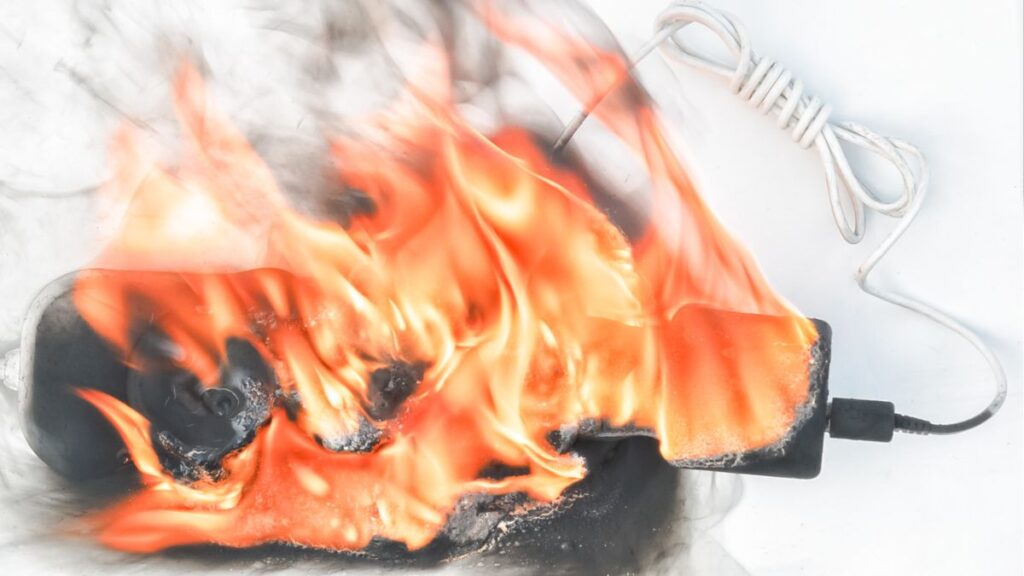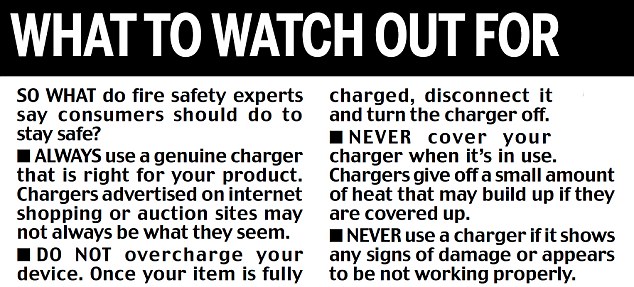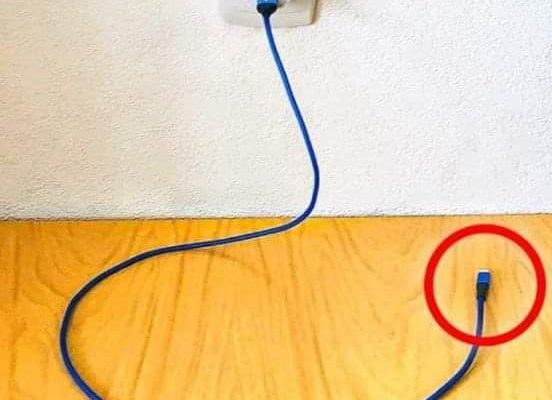Upon initial inspection, the tiny white plug that was packaged in bubble wrap and sent by mail seemed quite harmless.
Currently, hundreds of thousands of such devices are plugged into outlets in living rooms, kitchens, offices, and children’s bedrooms across the nation, powering mobile phones, of which 30 million are sold in the UK annually, not to mention in the US.
However, the explosion that occurred shortly after Katie Vines, a new mother, plugged the device into her bedroom wall was not innocuous at all, accompanied by a plume of black smoke.
The explosion was so strong that it literally broke the charger in two, leaving a thick, sooty ring around the plug.
But this wasn’t an isolated incident; the same gadget would be used a second time.

Care assistant Katie, who resides in Bristol with her partner Chris Smitherman and their 19-month-old daughter Aimee, still shudders at the thought of what might have been.
The November event has taken on a disturbing importance after it was discovered that a faulty charger was likely the cause of the fire that claimed the lives of three generations of the same family last month, including a nine-week-old newborn.
The Sheffield terrace home belonged to brothers Adyan Parwaiz Kayani, age nine, and Amaan Parwaiz Kayani, age seven, as well as their infant sister Minahil, aunt Anum Parwaiz, age 20, and grandma Shabina Begum, age 53. The fire began in the living room and spread throughout the house during the night of April 28.
Because of the severity of the damage, it can take many weeks for fire investigators to determine the exact origin of the fire or even the kind of charger that was being used.
However, a South Yorkshire Police spokesman stated that a “electrical fault involving a faulty charging device” was “the most probable cause” of the deadly incident.
The tragedy brings to light the mounting worries about potential hazards concealed beneath the surface of the commonplace wall-mounted charger.
Although the chargers that come with branded electronics are of the highest caliber and should not raise any red flags, low-cost, unapproved, or “unbranded” chargers—the kind that are typically purchased online, from flea markets, or overseas—can be dangerous instead of coming from reliable retailers and suppliers.
Many of the inexpensive gadgets that Electrical Safety First examines do not meet the criteria of the Electrical Equipment (Safety) Regulations Act 1994, the charity claims.
Steve Curtler, manager of product safety, issues a warning: ‘It’s driven by demand. People want multiple chargers to keep their lives going, one for home, one to take on holiday . . . When you can see one for £5 it seems worth taking the risk — at least that’s how it seems at the time.’
In China, unsafe devices are frequently produced for as little as 3p
Allegations have also been made that manufacturers may send tested goods that are well-engineered, but in an attempt to cut costs, they remove unnecessary components, raising the possibility of catastrophic breakdowns.
1.8 million mains mobile phone chargers are reportedly purchased online in the UK each year, raising concerns among safety experts that thousands of lives may be in danger.
The proof is clear: last year, while answering her iPhone while it was charging, Chinese air stewardess Ma Ailun, 23, accidentally overheated herself at home.
When seven-year-old Connor O’Keefe of South East London passed away in 2007 while playing with his Game Boy, he was using an inexpensive, generic charger that his family had purchased while on vacation in Thailand.
In his hotel room, they discovered him dead from electrocution. The charger showed “serious defects,” according to tests.
‘Until this happened to me, I would never have thought twice about buying a charger online,’ said Patsy, his mother. ‘But you don’t have to go to a foreign country to get a dodgy plug, you can get them here, or get them sent here.’
Yes, you can. Although iPhone mains plugs cost £15 from the Apple store, a USB cable will set you back an additional £15. Carphone Warehouse sells more generic USB mains chargers for £17.99 and Nokia small-pin chargers for £14.99.
However, if you go online, you may get a ton of bargains. You can get an iPhone 5 mains adaptor for as low as £3.69. You can also add an in-car charger for less than £5.
The same holds true for gadgets that work with Nokia, BlackBerry, and Samsung phones.
The 33-year-old Katie Vines was motivated to purchase an inexpensive charger online last year by this price difference. She wanted to purchase a replacement because her branded iPhone charger broke.
‘Aimee was only about three months old and I was on maternity leave, so we didn’t have a great deal of income,’ she says. ‘The branded products were quite expensive, so I decided to look online and found a charger being sold for about £4. The seller had good ratings and seemed to be in the UK, so I decided to buy it.’
The charger appeared completely safe when it was delivered. With minimal hesitation, Katie inserted it into the wall of her bedroom, just a short distance from her daughter’s crib, connected her phone, and proceeded to the bathroom, leaving partner Chris to change their infant’s diaper.
‘I’d only just got to the bathroom when I heard a huge bang and ran back into the bedroom,’ says Katie. ‘The charger had exploded and was practically fused to the wall.’
Katie phoned the vendor and apologized, explaining that she had mishandled the situation and that she would get a replacement charger. When the exact same incident occurred, she was taken aback. This time, the plug itself blew away and it was in her living room wall.
‘I was naive buying something off the internet because it was cheap. I thought if it had happened once, it wouldn’t happen again. But the damage could have been so much worse.’
‘As soon as I heard about the house fire in Sheffield I thought: “That could have been us.” When I think that Aimee’s cot was near the socket I used, it makes me sick.’

The Mail discovered many nationwide reports from the previous month of home fires that were linked to problems with a smartphone battery or charging apparatus.
Julie Swift, a mother of two from Bearsted, Kent, was startled a few days ago by a light and a “bang” from her phone. She had been lying in bed charging it with an inexpensive plug she had bought online.
Luckily, there was no damage caused by the explosion, even though it tripped all of the house’s electrics.
‘I still charge my phone overnight now, but only with an official Apple charger and not near my head,’ says Julie, 48. ‘I feel very lucky that this happened to me and not to my 12-year-old daughter.’
Fire chiefs attest to the problem’s escalating nature. In the meanwhile, several manufacturers are now offering new phones with just a USB cable—which is used to charge via your computer—instead of a typical wall connection due to European regulations limiting the reduction of electrical waste.
Experts predict that this will just drive consumers to look for less expensive plug-in substitutes.
It was revealed last year that over the preceding four years, the amount of counterfeit electrical goods seized in the UK had increased six-fold.
Additionally, the value of the items that the Border Force and councils confiscated increased from slightly over £2.6 million in 2009 to more than £15.7 million in 2012. Chargers were the most often seized items.
Trading Standards inspectors in Ealing, West London, discovered almost 67,000 potentially hazardous cellphone chargers during a single raid last year.
What therefore needs to go wrong for a charger to explode up?
Unfortunately, the majority of flaws affect internal components rather than being apparent to the buyer. For instance, the gadget might not have a proper fuse to guarantee that any power surge or explosion is safely contained in the event that something else on the phone malfunctions, such the battery.
According to Steve Curtler, dubious technologies frequently lack this. This implies that there is a chance of fire and electric shock if the charger overheats and pressure builds up, blowing the charger apart.
Cheaper items frequently have pins that are positioned wrongly or too tiny. They can harm the socket and cause overheating if they are the incorrect size.
Fire safety specialists emphasize that chargers should never be covered since they have the potential to ignite under severe heat, even in the absence of a naked flame.
Pins are required by law to be 9.5 mm from the charger body’s edge. There is a genuine risk of electric shock from skin contact if the distance is shorter, as it was with nine chargers in a recent sample test.
As a consumer, you may prefer to believe that a product is safe if it bears the CE mark, which is the manufacturer’s declaration that the product complies with European legal criteria. Unfortunately, it’s very simple to fake this.
Additionally, a lot of people charge their smartphones overnight. Is this secure? Steve Curtler nevertheless suggests exercising caution, despite Apple’s insistence that its products are made so ‘you can keep your device plugged in as long as you would like.’
‘It does extend the risk unnecessarily. And the risk is exacerbated by using a cheap, unbranded charger. And when you are asleep you are less alert and less able to react.’
Make sure you have a functional smoke detector if you must leave your phone charging overnight, he advises.
Similarly, if you leave your charger plugged in while not in use, you should turn off your electricity at the wall.
Basic advice, but as Katie Vines is all too aware of, it may save a life.



